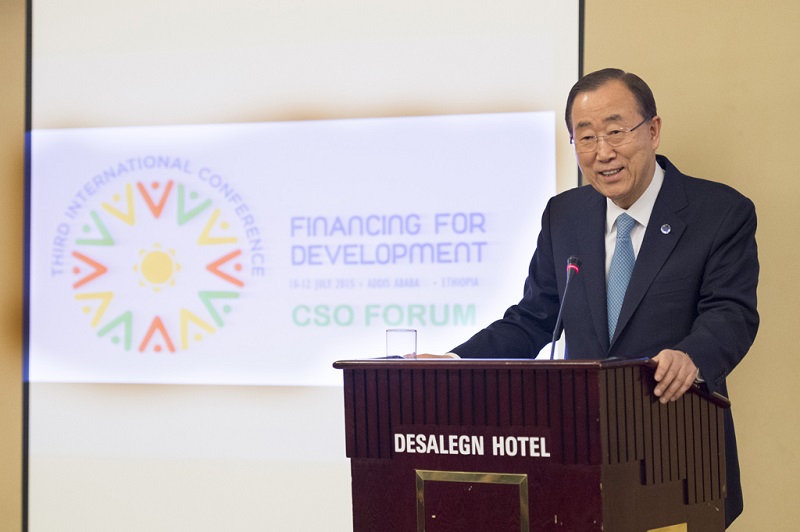Civil Society

Secretary-General Ban Ki-moon addresses the Global Civil Society Forum held in Addis Ababa, Ethiopia, on the eve of the opening of the Third International Conference on Financing for Development. UN Photo/Eskinder Debebe
Engaging Civil Society and the Media
The engagement of civil society, including women and youth, as well as the media, as critical stakeholder is fundamental for the promotion of peace, security and development in Africa.
Recognizing this imperative, African governments and the African Union (AU) have made a strong commitment to work in partnership with civil society and other partners including the media, especially as strongly evident in the recent process of formulating the African Union’s Agenda 2063 and its first Ten-year Implementation Plan.
The AU’s commitment builds on earlier vision in establishing the African Union’s Economic, Social and Cultural Council (ECOSOCC) under the provisions of Articles 5 and 22 of the African Union’s Constitutive Act ![]() as the vehicle for building a strong partnership between governments and all segments of African civil society. The Statute of ECOSOCC, adopted by the Heads of State and Government at the Third Ordinary Session of the Assembly in July 2004 defines it as an advisory organ of the African Union composed of different social and professional groups of the Member States of the African Union [Assembly/AU/Dec.42 (III)].
as the vehicle for building a strong partnership between governments and all segments of African civil society. The Statute of ECOSOCC, adopted by the Heads of State and Government at the Third Ordinary Session of the Assembly in July 2004 defines it as an advisory organ of the African Union composed of different social and professional groups of the Member States of the African Union [Assembly/AU/Dec.42 (III)].
OSAA’s Role
The Office of the Special Adviser on Africa (OSAA):
- Supports the work of civil society organizations through the publication of a number of reports highlighting their contributions to addressing issues on peace, security and development in Africa;
- Published and maintains a NGO database of African civil society organizations aimed at promoting their accessibility to the UN;
- Partners with civil society organizations to organize thematic high-level events.
The role of civil society will continue to grow, as they are expected to be significantly involved in monitoring progress in achieving the forthcoming post-2015 development agenda at global level, as well as AU’s Agenda 2063 and its first Ten-year Implementation Plan at continental, regional and national levels, among others. Their continuous and active engagement and contribution to conflict prevention, management and resolution as well as peace-building efforts are also highly anticipated. In this respect, OSAA will continue to expand its engagement with civil society, including women and youth, to ensure their full and active participation in Africa’s development.
Engaging Civil Society

Are you working for an NGO operating in Africa? We want to hear from you!
Please register in our database and/or update your profile.
Across the continent, democracy is spreading, backed by the African Union (AU), which has shown a new resolve to deal with conflicts and censure deviation from the norm. These efforts are reinforced by voices in civil society, including associations of women, youth and the independent media.

